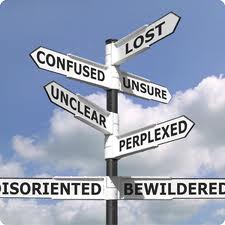The Wellness Coach And Referring Clients To A Mental Health Professional: PART ONE – WHEN

A critical issue for all coaches is to be clear about when and how to refer a client who is best served by seeing a mental health professional either instead of coaching, or in conjunction with it. This will be the first of a multiple post series on this vital topic.
Working on lifestyle improvement is going to bring up emotions. How a client feels about their own body is just as important as how they treat it physically. Internal barriers to change rear their ugly head just when a client if finally making some great progress in their efforts to lose weight, manage their stress, quit using tobacco, etc. Internal barriers can include such tricky subjects as one’s belief systems, optimism/pessimism, listening to their own “Inner Critic” or “Gremlin”, and self-defeating self-talk. A good coach can help a client process feelings, but what should a coach do when it seems that coaching is getting “too psychological”?
For approximately twenty-seven years I practiced psychotherapy and thoroughly enjoyed it. I loved seeing people grow, and yes, heal. For over sixteen years now I’ve been working as a professional life and wellness coach. Our company, The Wellness Coach Training Institute (http://www.realbalance.com) has trained over 3,000 coaches worldwide. In doing so we’ve learned that making the distinction between coaching and counseling/psychotherapy is often challenging for coaches. Lets explore what the standards of our coaching profession are about this distinction, and I will also inject my own professional opinion into some of the gray areas.
1) Who NOT to coach! When referral needs to happen up front.
Wellness coaches sometimes find people approaching them for coaching for severe problems that need to be addressed in counseling/psychotherapy. A classic example was the woman who called me saying she had heard good things about my coaching. Immediately she asked if I would coach her about her relationship with her live-in boyfriend. Both of them were self-described alcoholics and he was physically abusing her. What’s more the abuse and alcoholism was precisely what she wanted to “coach” about. I responded empathically, but immediately referred her to her choice of three fine therapists here in town that I personally could recommend. Coaching is just not designed to substitute for therapy. When you are clear that the person you are dealing with has such serious issues gently, but firmly make the referral on the spot and refuse to coach the person.
 Attempting to avoid the stigma of psychotherapy, or even the self-admission that they need serious help, some folks will seek out a coach instead. If the coach takes the bait and sees them there are two dangers: the change they need will not take place (nothing will happen), or, much too much will happen! The in-over-their-head coach could be overwhelmed with potentially dangerous scenarios of behavior.
Attempting to avoid the stigma of psychotherapy, or even the self-admission that they need serious help, some folks will seek out a coach instead. If the coach takes the bait and sees them there are two dangers: the change they need will not take place (nothing will happen), or, much too much will happen! The in-over-their-head coach could be overwhelmed with potentially dangerous scenarios of behavior.
Having hospitalized clients as a psychologist I have seen what suicidal behavior, psychotic breaks and more really look like. This is the territory for someone with a high level of professional training: masters and doctoral level training in clinical skills and a valid license to practice counseling and/or psychotherapy. Coaches need to respect their own limits and help people who come to them needing more than what coaching can provide to find the real help they need.
2) When to refer a client you are currently coaching.
This question of when to refer falls roughly into two categories; what you might call the “obvious” and the more complex. Let’s look at the more obvious, easier to spot situations.
 Here we draw upon the excellent article written by Lynn F. Meinke, MA, RN, CLC, CSLC , “Top Ten Indicators to Refer a Client to a Mental Health Professional.” This is available free to the public at the ICF Website by following this link http://www.coachfederation.org/articles/index.cfm?action=view&articleID=773§ionID=27.
Here we draw upon the excellent article written by Lynn F. Meinke, MA, RN, CLC, CSLC , “Top Ten Indicators to Refer a Client to a Mental Health Professional.” This is available free to the public at the ICF Website by following this link http://www.coachfederation.org/articles/index.cfm?action=view&articleID=773§ionID=27.
The article goes into good detail on each of the indicators listed below and is a MUST READ for any coach.
Make sure you refer your client to a mental health professional when
YOUR CLIENT:
(1) Is exhibiting a decline in his/her ability to experience pleasure and/or an increase in being sad, hopeless and helpless.
(2) Has intrusive thoughts or is unable to concentrate or focus.
(3) Is unable to get to sleep or awakens during the night and is unable to get back to sleep or sleeps excessively.
(4) Has a change in appetite: decrease in appetite or increase in appetite.
(5) Is feeling guilty because others have suffered or died.
(6) Has feelings of despair or hopelessness.
(7) Is being hyper alert and/or excessively tired.
(8) Has increased irritability or outbursts of anger.
(9) Has impulsive and risk-taking behavior.
(10) Has thoughts of death and/or suicide.
The “more complex” times when referral comes into question is when it appears that your client is still functioning fairly well, but the coaching is just not getting anywhere and the reason is in the psychology of your client. This can look a couple of ways:
A) Your client keeps making attempts to change their way of living, but keeps holding themselves back with self-defeating behavior. You may keep coming back to an old issue that still needs healing and is in the way of progress. An example could be a client whose self-doubt stemming from a severely critical parent is so great that they continually will not give themselves permission to risk new behaviors. You try some good process coaching, but still you find that you both just keep coming back to the same stuck spot. A great time to refer.
B) When your client just seems to want to process feelings endlessly. The progress that should be seen processing feelings leading to insight, which is then translated into action steps towards growth, seems blocked. You may find that you are able to continue to coach your client around wellness and lifestyle improvement while they get their therapy needs met by a qualified counselor/psychotherapist. Your challenge is to again, not take the bait. When your client heads into the therapy realm, say something empathic but then add “You know, that would be a great thing to talk to your counselor about! Therapists can help with that much more than coaching can.”
Next time we’ll explore when to keep on coaching and look at the ethical questions that arise when coaching makes promises it really can’t keep.
An excellent resource to check out: “Coaching or Therapy: A Map For Coaches.”
http://www.benhamconsulting.com/coaching_or_therapy.html








Only registered and logged in readers can leave comments.